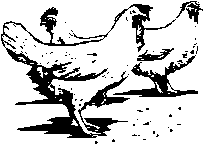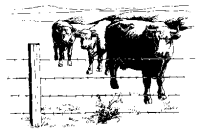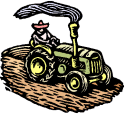

To send a message to an author, click on the author's name at the end of the article.
This Month in Ag Connection | Ag Connection - Other Issues Online

The Internet is an important business tool for buyers and sellers of hay. It provides an excellent means of searching and communicating, which are key components of an efficient market.
In addition to providing a posting site for "Hay for Sale" and "Hay Wanted", some of the Internet sites provide hay price calculators, bale weight calculators and bulletin boards. Many of the sites provide listings at no charge. The following is a sample of sites you may want to investigate and consider utilizing.

Note: Links to commercial websites do not imply endorsement.
(Authors: Parman R. Green, and Mary Sobba, Ag usiness Management Specialists)
This Month in Ag Connection | Ag Connection - Other Issues Online

On October 1, 2002, Exotic Newcastle Disease (END) was confirmed in backyard poultry and game fowl in southern California. Since that time, numerous backyard premises have been quarantined for END. On December 27, 2002 and January, 2003, the disease was also confirmed in flocks of layer chickens in the same area of California. The mortality rate associated with disease in commercial chickens has been relatively low compared to that in the backyard and game fowl flocks, which has been 75-100%. Five counties (Los Angeles, Riverside, San Bernardino, San Diego, and Orange counties) or portions thereof are under a state and federal quarantine to restrict bird movement.
The causative agent of END is a virus (Rubulavirus) in the family Paramyxoviridae. The virus can persist in feces for long periods of time and some bird species (parrots and some wild birds) may be carriers of the virus. Outbreaks of the disease can cause severe losses in a short period of time. Birds can contract the disease by direct contact with infected birds, feces or other body secretions, exposures over short distances to aerosols from coughing and sneezing, or contaminated equipment, clothing, etc. The incubation period for the disease varies from 2-15 days with incubation in chickens being 2-6 days.
Clinical symptoms of the disease can include: a sudden death loss or increase in losses, high rates of death, gasping for air, coughing, sneezing, green watery diarrhea, depression, loss of appetite, droopy wings, twisting of the head and neck, circling, drop in egg production, paralysis and muscle spasms. There may also be nasal discharge, with swelling around the neck and eyes.
This disease can cause devastating costly losses in commercial poultry, backyard and hobby flocks, pet bird aviaries, etc. There is no effective cure for the disease and the only way to eradicate the disease is by strict quarantine, surveillance and depopulation.
Poultry producers need to be reminded to follow strict biosecurity practices to protect their flocks. Examples of such practices are:
If any commercial poultry producer, backyard flock owner, or pet bird owner observe any unusual symptoms that could possibly be Exotic Newcastle Disease (END), contact Dr. Dave Hopson (573) 751-3377 or Ms. Rose Foster (573) 522-3377.
(Author: Dave Hopson, Emergency Preparedness, State Meat and Poultry Inspection and Food Safety and Quality Assurance, Division of Animal Health, Missouri State Department of Agriculture, Email: Animal_Health@mail.mda.state.mo.us)
This Month in Ag Connection | Ag Connection - Other Issues Online

Many cattle producers believe the leading reason to participate in a marketing alliance is to gain power through collective bargaining. Although market power may be one reason to invest in these groups, the real issue is quality. Is the product of higher quality or not? Whether or not a premium is expected should be based on carcass quality. Grouping calves, administering a predetermined health program and preconditioning does increase the value of the animal. Therefore a premium should be received. However, the premium is based on added quality, not simply market power.
So how is quality or value measured to ensure producers receive what they deserve? Two groups of calves from the same farm with similar health programs and phenotypes (physical appearance) may have significantly different returns in the feedlot. This variation may be explained by variations in genotype (genetic makeup). Carcass quality has a major impact on value, however many cow/calf producers are unsure how their calves will perform in the feedlot or yield/grade on the rail. All of which impacts profit or loss.
The importance of obtaining feedlot performance and carcass quality data is the main reason to participate in a marketing alliance. If feedlot and carcass data are used to improve genetics, it will be more valuable in the long-term than any short-term profit or loss obtained from participating in the program. Producers should focus on quality to ensure the industry is producing what consumers want.
If a producer plans to be in the cattle business beyond the next five years, quality must be a primary focus. When shopping for a marketing alliance look for one that obtains carcass data. Find out what you have so you can make it better.
(Author: Wesley Tucker, Ag Business Specialist)
This Month in Ag Connection | Ag Connection - Other Issues Online

When over-seeding legumes into pastures, it is critical to control competition. Graze competition until the legume is just beginning to be eaten. If competition returns too soon, it may be necessary to once again graze or clip the pastures. Competition will likely do more to reduce legume development than harvesting too soon.
See UMC Guide 4651, Renovating Grass Sods with Legumes.
(Authors: Wesley Tucker, Ag Business Specialist and Todd Lorenz, Horticulture/Agronomy Specialist)
This Month in Ag Connection | Ag Connection - Other Issues Online
MU extension agronomist Shawn Conley has developed Mizzou Crop Forum, an online site where producers of alternative grains can exchange information about how to grow them and where to sell them.

One purpose of the forum is to facilitate communication between growers and potential markets. For example, Conley says, "there are several bakeries in Kansas City that have a use for grain amaranth, buckwheat and some of the soft white wheats. They have to import these grains from places like North Dakota. Through the forum, we can ask them whether they'd like to buy a product that's locally produced."
"Not only are there savings in transportation costs, Conley said, but locally grown food enjoys a high reputation with consumers that explains its marketing cachet with grocers, restaurateurs and wholesalers."
The web site for Mizzou Crop Forum is: http://www.psu.missouri.edu/forums/. It features a search function so users can type in a subject like "sunflowers" and get information about buyers, sellers and production methods.
With Missouri's environmental diversity, Conley says, "we can grow about anything here, from corn and soybeans to cotton and rice. Southwest Missouri has a climate that might be favorable for growing some white wheat varieties. In the north, we have cooler nights where we can grow crops that don't do as well in the constant heat."
"Being able to produce isn't the issue," Conley said. "What we need, and what we're trying to do, is to raise the awareness that these alternatives are available."
(Author: Forrest Rose, Information Specialist, University of Missouri, College of Agriculture, Food and Natural Resources)
This Month in Ag Connection | Ag Connection - Other Issues Online

In calculating adjusted gross income on Form 1040, self-employed taxpayers can deduct 70% of the 2002 (100% for 2003) health insurance payments for themselves, their spouse and dependents.
(Author: Parman Green, Ag Business Specialist)
This Month in Ag Connection | Ag Connection - Other Issues Online
New rules apply for renewal.
Check with your local University Extension Center for dates for either face-to-face training, watch a video for renewal or to obtain a license.
This Month in Ag Connection | Ag Connection - Other Issues Online
Publishing Information
Ag Connection is published monthly for Northeast and Central areas of Missouri producers and is supported by the University of Missouri Extension, the Missouri Agricultural Experiment Station, and the MU College of Agriculture, Food and Natural Resources. Managing Editor: Mary Sobba.